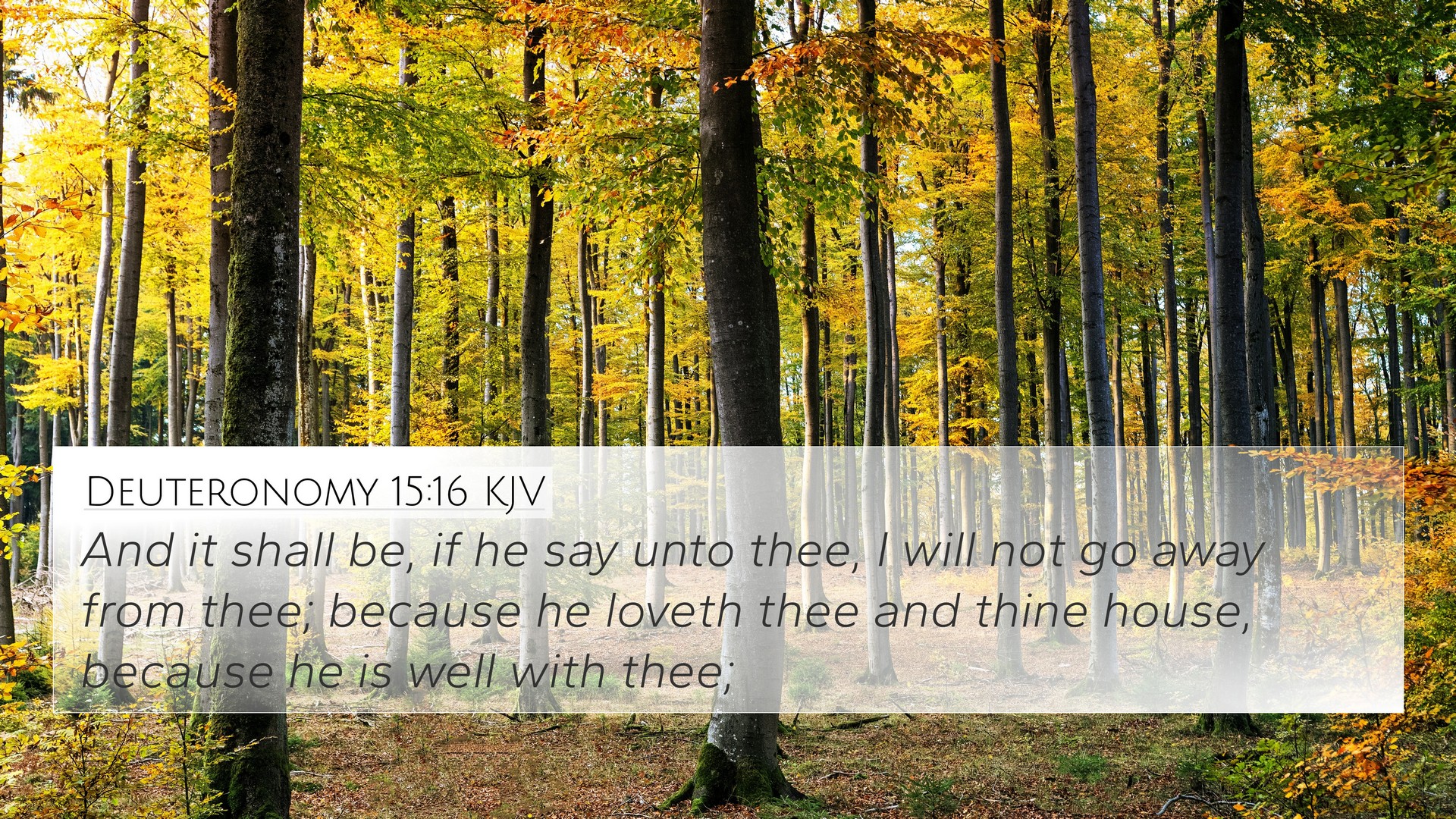Understanding Deuteronomy 15:16
Deuteronomy 15:16 states, "And it shall be, if he say unto thee, I will not go away from thee; because he loveth thee and thine house, because he is well with thee;" This verse addresses the situation regarding a Hebrew servant's choice to remain with his master after the sabbatical year, showcasing themes of loyalty, love, and hospitality. The implications of this passage are rich and multifaceted, drawing connections with broader Biblical principles of service and community.
Verse Meaning and Interpretation
This verse emphasizes the voluntary nature of servitude. The servant's desire to stay reflects his love for the master's household and the well-being he experiences there. The heart of this passage is tied to the themes of devotion, community, and the positive sanctity of the master-servant relationship.
Key Insights from Commentaries
- Matthew Henry: Henry highlights the servant's voluntary commitment as a profound act of loyalty, illustrating the transformative nature of genuine kindness and goodwill in relationships. He emphasizes that such loyalty stems from the experience of love and care.
- Albert Barnes: Barnes points out that this passage denotes a significant relational dynamic, where the servant, moved by love, expresses his desire to remain. This reflects an ideal community where individuals care for each other's well-being.
- Adam Clarke: Clarke adds that the significance of the servant's decision lies in the recognition of his good treatment. This aspect underlines the moral responsibility of the master to create an environment of contentment and gratitude.
Connections Between Bible Verses
Deuteronomy 15:16 serves as a pivotal verse that harmonizes with several other scripture passages, illustrating inter-biblical themes. Below are Bible verse cross-references that enhance the understanding of this verse:
- Exodus 21:5-6: This passage discusses the laws concerning Hebrew servants and their option to remain with their masters if they choose love over freedom.
- Leviticus 25:39-41: This verse also addresses the treatment of fellow Israelites and the restoration of their dignity, paralleling themes of love and commitment seen in Deuteronomy 15.
- 1 Corinthians 7:21-23: Paul discusses the state of servitude in the New Testament context, emphasizing the spiritual freedom one can have, even within earthly servitude.
- Galatians 4:7: This verse speaks to the transition from servitude to sonship, reaffirming the idea of belonging and relationship in God's household.
- Luke 16:13: Jesus teaches that no servant can serve two masters, emphasizing the loyalty that Deuteronomy 15:16 seeks to represent.
- Matthew 22:39: Here, the love of neighbor reflects the deep relational commitments that resonate with the voluntary servitude described in Deuteronomy 15:16.
- Romans 12:10: This verse encourages believers to love one another with brotherly affection, aligning with the core message of mutual respect and love found in our verse.
Thematic Bible Verse Connections
The thematic connections present throughout the Bible can allow for a deeper understanding of the values embedded in Deuteronomy 15:16. The act of choosing to remain with someone due to love connects with several crucial doctrines:
- Love and Service: Throughout scripture, the act of serving others out of love is upheld as a central virtue, demonstrated by Christ's own life.
- Community Relations: The communal aspects of love and service highlight the Biblical call to foster environments where people flourish.
- Redemptive Relationships: The servant's choice also reflects God's desire for redeemed relationships among people.
Tools for Bible Cross-Referencing
For those interested in exploring these inter-Biblical connections further, various tools are available:
- Bible Concordance: Utilize a concordance to find words and themes that resonate with Deuteronomy 15:16.
- Bible Reference Resources: These include study guides and thematic commentaries that delve into the meanings behind various verses.
- Cross-Reference Bible Study: Engage in studies that facilitate understanding of Biblical context through related verses and themes.
Inter-Biblical Dialogue
The conversation between Old and New Testament teachings provides a fuller picture of the implications of being rooted in community and loyalty. The servant's choice is exemplary of the kind of love God desires among His people—an enduring commitment grounded in mutual care.
As a believer, recognizing these layers within Deuteronomy 15:16 helps not only in understanding the text itself but also in applying these principles to daily life. Through the love we show and the communities we build, we echo the profound truths found within Scripture.





